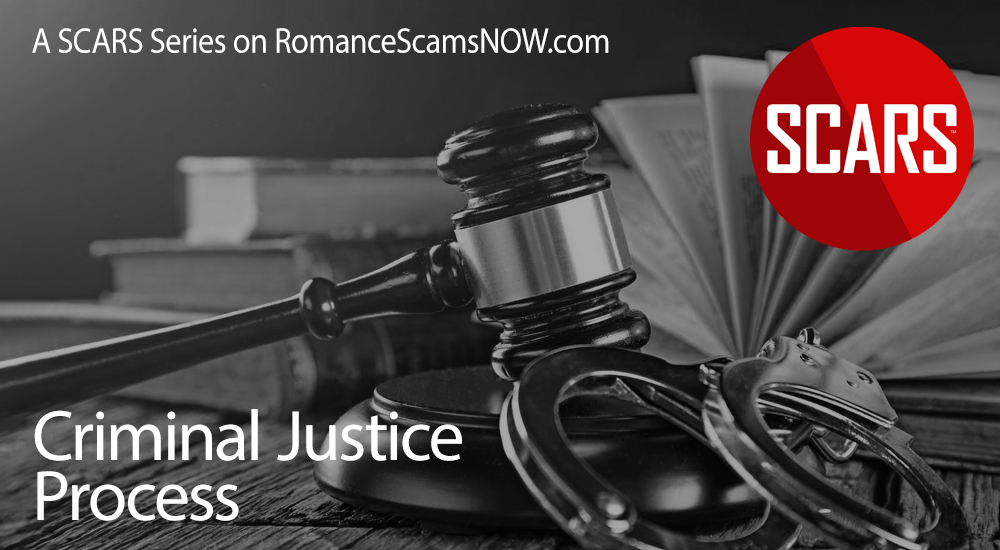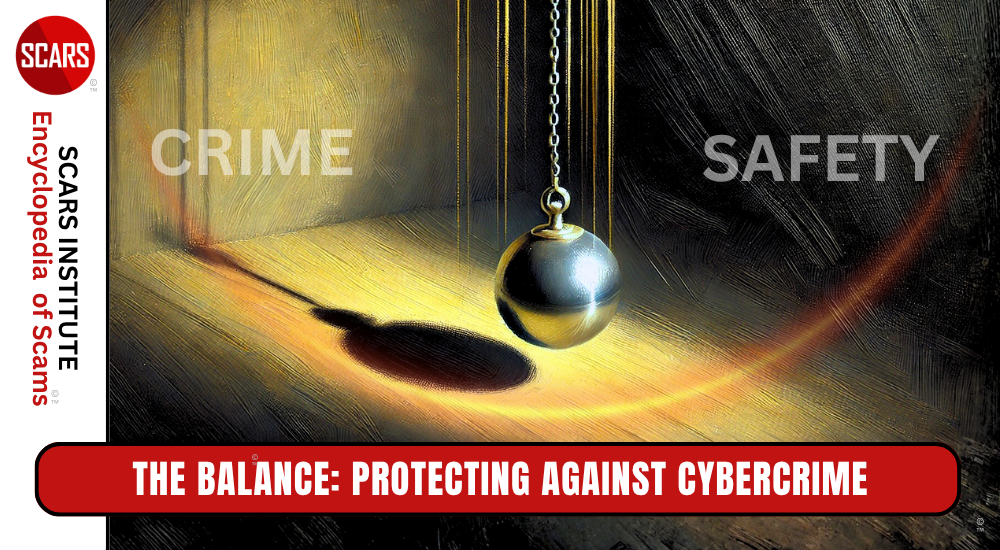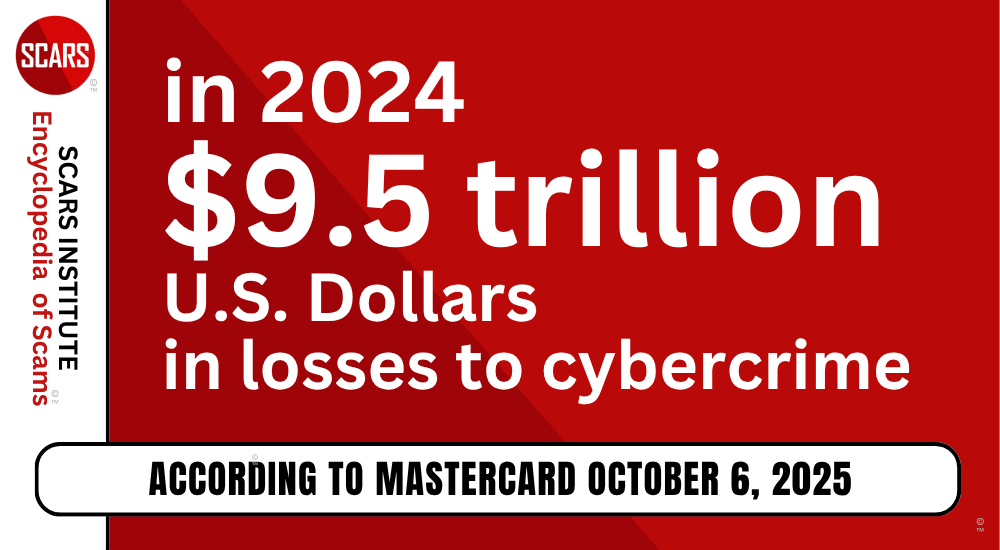
SCARS Institute’s Encyclopedia of Scams™ Published Continuously for 25 Years

Wire Fraud: The Most Powerful Law In Crypto & Scams Right Now!
Portions courtesy of Reuters
Regulation and enforcement in the cryptocurrency space are hot topics, with the debate centered around the complex issue of whether to classify digital assets as securities, commodities, or a separate asset class entirely.
In the middle of this debate, the Department of Justice (DOJ) has sent a message — the classification does not matter for its purposes. In recent prosecutions, DOJ has used the wire fraud statute, 18 U.S.C. § 1343, a law with origins dating back to the 1800s, to bring innovative cases in the Internet fraud and cryptocurrency space, and scams in general, that do not depend on how a digital activity or asset is classified.
Since then, DOJ has used wire fraud to prosecute the first two rug pulls involving NFTs and to prosecute two digital asset insider trading cases, and countless online fraud or scam cases. The DOJ has recently used wire fraud in large-scale scammer cases and it seems to be a great area of focus, given public reports of scams, and it application in crypto fraud of all kinds such as spoofing (creating orders with the intent to cancel) by crypto whales, who are individuals or entities that own substantial amounts of a particular cryptocurrency.
Wire Fraud Is:
Whoever, having devised or intending to devise any scheme or artifice to defraud, or for obtaining money or property by means of false or fraudulent pretenses, representations, or promises, transmits or causes to be transmitted by means of wire, radio, or television communication in interstate or foreign commerce, any writings, signs, signals, pictures, or sounds for the purpose of executing such scheme or artifice, shall be fined under this title or imprisoned not more than 20 years, or both. If the violation occurs in relation to, or involving any benefit authorized, transported, transmitted, transferred, disbursed, or paid in connection with, a presidentially declared major disaster or emergency (as those terms are defined in section 102 of the Robert T. Stafford Disaster Relief and Emergency Assistance Act (42 U.S.C. 5122)), or affects a financial institution, such person shall be fined not more than $1,000,000 or imprisoned not more than 30 years, or both.
Before You Give Up
- It is important to know what laws apply to scams and scammers – this is just one
- A mistake most victims make when trying to report their crime to the police is using the word “SCAM” & “SCAMMERS” – scams are FRAUD, and when you use the right word “fraud” the police understand this far better and will respond to your report far easier.
In this article, we are going to talk about “wire” – this just means phones, the Internet, or any communication today – all internet or cell phone communications are considered by wire.
The Wire Fraud Statute In Brief
The wire fraud statute is based on the nearly identical mail fraud statute, which was enacted in 1872 to combat fraud committed through the mail.
The wire fraud statute expanded the law beyond the mails to include the telephone, and now all forms of telecommunication including email, text messaging and social media. In general terms, the wire fraud statute prohibits using a “wired” communication to obtain money or property through a scheme to defraud, which is often accomplished through misrepresentations or false promises. This means it applies to online fraud (scams).
The statute is adaptable; it is not limited by subject matter. Prosecutors have applied it to insider trading schemes, money laundering, scam schemes, impersonation & spoofing, and more recently in cryptocurrency market manipulation.
It is a powerful tool for prosecutors. For this reason, Judge Jed Rakoff famously quipped that to prosecutors the mail and wire fraud statutes are “our Stradivarius, our Colt 45, our Louisville Slugger, our Cuisinart — and our true love.” (Jed S. Rakoff, “The Federal Mail Fraud Statute (Part 1),” 8 Duq. L. Rev. 771, 771 (1980)). DOJ’s recent cases only prove Judge Rakoff’s point.
The elements of wire fraud under Section 1343 directly parallel those of the mail fraud statute but require the use of an interstate telephone call or electronic communication (such as the Internet) made in furtherance of the scheme.
In the case: United States v. Briscoe, 65 F.3d 576, 583 (7th Cir. 1995) (citing United States v. Ames Sintering Co., 927 F.2d 232, 234 (6th Cir. 1990) (per curiam)); United States v. Frey, 42 F.3d 795, 797 (3d Cir. 1994) (wire fraud is identical to mail fraud statute except that it speaks of communications transmitted by wire); see also, e.g., United States v. Profit, 49 F.3d 404, 406 n. 1 (8th Cir.) (the four essential elements of the crime of wire fraud are: (1) that the defendant voluntarily and intentionally devised or participated in a scheme to defraud another out of money; (2) that the defendant did so with the intent to defraud; (3) that it was reasonably foreseeable that interstate wire communications would be used; and (4) that interstate wire communications were in fact used) (citing Manual of Model Criminal Jury Instructions for the District Courts of the Eighth Circuit 6.18.1341 (West 1994)), cert. denied, 115 S.Ct. 2289 (1995); United States v. Hanson, 41 F.3d 580, 583 (10th Cir. 1994) (two elements comprise the crime of wire fraud: (1) a scheme or artifice to defraud; and (2) use of interstate wire communication to facilitate that scheme); United States v. Faulkner, 17 F.3d 745, 771 (5th Cir. 1994) (essential elements of wire fraud are: (1) a scheme to defraud and (2) the use of, or causing the use of, interstate wire communications to execute the scheme), cert. denied, 115 S.Ct. 193 (1995); United States v. Cassiere, 4 F.3d 1006 (1st Cir. 1993) (to prove wire fraud government must show (1) scheme to defraud by means of false pretenses, (2) defendant’s knowing and willful participation in scheme with intent to defraud, and (3) use of interstate wire communications in furtherance of scheme); United States v. Maxwell, 920 F.2d 1028, 1035 (D.C. Cir. 1990) (“Wire fraud requires proof of (1) a scheme to defraud; and (2) the use of an interstate wire communication to further the scheme.”).
Conclusion
As online fraud and crypto becomes mainstream, prosecutors have responded with one of DOJ’s oldest tools — wire fraud. In the first half of 2022, DOJ was actively prosecuting cases under the wire fraud statute, and we can expect that trend to continue and expand into other areas of financial fraud traditionally prosecuted by the DOJ.
Remember
- Always report all scam cases as Fraud or Wire Fraud.
- Do not call them scammers, call then criminals
-/ 30 /-
What do you think about this?
Please share your thoughts in a comment below!
LEAVE A COMMENT?
Recent Comments
On Other Articles
- Arwyn Lautenschlager on Love Bombing And How Romance Scam Victims Are Forced To Feel: “I was love bombed to the point that I would do just about anything for the scammer(s). I was told…” Feb 11, 14:24
- on Dani Daniels (Kira Lee Orsag): Another Scammer’s Favorite: “You provide a valuable service! I wish more people knew about it!” Feb 10, 15:05
- on Danielle Delaunay/Danielle Genevieve – Stolen Identity/Stolen Photos – Impersonation Victim UPDATED 2024: “We highly recommend that you simply turn away form the scam and scammers, and focus on the development of a…” Feb 4, 19:47
- on The Art Of Deception: The Fundamental Principals Of Successful Deceptions – 2024: “I experienced many of the deceptive tactics that romance scammers use. I was told various stories of hardship and why…” Feb 4, 15:27
- on Danielle Delaunay/Danielle Genevieve – Stolen Identity/Stolen Photos – Impersonation Victim UPDATED 2024: “Yes, I’m in that exact situation also. “Danielle” has seriously scammed me for 3 years now. “She” (he) doesn’t know…” Feb 4, 14:58
- on An Essay on Justice and Money Recovery – 2026: “you are so right I accidentally clicked on online justice I signed an agreement for 12k upfront but cd only…” Feb 3, 08:16
- on The SCARS Institute Top 50 Celebrity Impersonation Scams – 2025: “Quora has had visits from scammers pretending to be Keanu Reeves and Paul McCartney in 2025 and 2026.” Jan 27, 17:45
- on Scam Victims Should Limit Their Exposure To Scam News & Scammer Photos: “I used to look at scammers photos all the time; however, I don’t feel the need to do it anymore.…” Jan 26, 23:19
- on After A Scam, No One Can Tell You How You Will React: “This article was very informative, my scams happened 5 years ago; however, l do remember several of those emotions and/or…” Jan 23, 17:17
- on Situational Awareness and How Trauma Makes Scam Victims Less Safe – 2024: “I need to be more observant and I am practicing situational awareness. I’m saving this article to remind me of…” Jan 21, 22:55
ARTICLE META
Important Information for New Scam Victims
- Please visit www.ScamVictimsSupport.org – a SCARS Website for New Scam Victims & Sextortion Victims
- Enroll in FREE SCARS Scam Survivor’s School now at www.SCARSeducation.org
- Please visit www.ScamPsychology.org – to more fully understand the psychological concepts involved in scams and scam victim recovery
If you are looking for local trauma counselors please visit counseling.AgainstScams.org or join SCARS for our counseling/therapy benefit: membership.AgainstScams.org
If you need to speak with someone now, you can dial 988 or find phone numbers for crisis hotlines all around the world here: www.opencounseling.com/suicide-hotlines
A Note About Labeling!
We often use the term ‘scam victim’ in our articles, but this is a convenience to help those searching for information in search engines like Google. It is just a convenience and has no deeper meaning. If you have come through such an experience, YOU are a Survivor! It was not your fault. You are not alone! Axios!
A Question of Trust
At the SCARS Institute, we invite you to do your own research on the topics we speak about and publish, Our team investigates the subject being discussed, especially when it comes to understanding the scam victims-survivors experience. You can do Google searches but in many cases, you will have to wade through scientific papers and studies. However, remember that biases and perspectives matter and influence the outcome. Regardless, we encourage you to explore these topics as thoroughly as you can for your own awareness.
Statement About Victim Blaming
SCARS Institute articles examine different aspects of the scam victim experience, as well as those who may have been secondary victims. This work focuses on understanding victimization through the science of victimology, including common psychological and behavioral responses. The purpose is to help victims and survivors understand why these crimes occurred, reduce shame and self-blame, strengthen recovery programs and victim opportunities, and lower the risk of future victimization.
At times, these discussions may sound uncomfortable, overwhelming, or may be mistaken for blame. They are not. Scam victims are never blamed. Our goal is to explain the mechanisms of deception and the human responses that scammers exploit, and the processes that occur after the scam ends, so victims can better understand what happened to them and why it felt convincing at the time, and what the path looks like going forward.
Articles that address the psychology, neurology, physiology, and other characteristics of scams and the victim experience recognize that all people share cognitive and emotional traits that can be manipulated under the right conditions. These characteristics are not flaws. They are normal human functions that criminals deliberately exploit. Victims typically have little awareness of these mechanisms while a scam is unfolding and a very limited ability to control them. Awareness often comes only after the harm has occurred.
By explaining these processes, these articles help victims make sense of their experiences, understand common post-scam reactions, and identify ways to protect themselves moving forward. This knowledge supports recovery by replacing confusion and self-blame with clarity, context, and self-compassion.
Additional educational material on these topics is available at ScamPsychology.org – ScamsNOW.com and other SCARS Institute websites.
Psychology Disclaimer:
All articles about psychology and the human brain on this website are for information & education only
The information provided in this article is intended for educational and self-help purposes only and should not be construed as a substitute for professional therapy or counseling.
While any self-help techniques outlined herein may be beneficial for scam victims seeking to recover from their experience and move towards recovery, it is important to consult with a qualified mental health professional before initiating any course of action. Each individual’s experience and needs are unique, and what works for one person may not be suitable for another.
Additionally, any approach may not be appropriate for individuals with certain pre-existing mental health conditions or trauma histories. It is advisable to seek guidance from a licensed therapist or counselor who can provide personalized support, guidance, and treatment tailored to your specific needs.
If you are experiencing significant distress or emotional difficulties related to a scam or other traumatic event, please consult your doctor or mental health provider for appropriate care and support.
Also read our SCARS Institute Statement about Professional Care for Scam Victims – click here to go to our ScamsNOW.com website.










![United States Military ID Cards - How To Spot Fakes - [UPDATED 2025] fake military id cards United States Military ID Cards - How To Spot Fakes - [UPDATED 2025] - on the SCARS Institute RomanceScamsNOW.com - the Encyclopedia of Scams™](https://romancescamsnow.com/wp-content/uploads/2022/03/fake-military-id-cards.png)





Thank you for your comment. You may receive an email to follow up. We never share your data with marketers.